
"Ain't That Peculiar" is a 1965 song recorded by American soul musician Marvin Gaye for the Tamla (Motown) label.
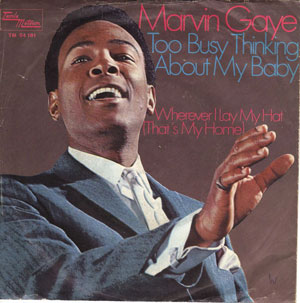
"Too Busy Thinking About My Baby" is a Motown song written by Norman Whitfield, Barrett Strong, and Janie Bradford. The song was first recorded by The Temptations as a track on their 1966 album Gettin' Ready. Eddie Kendricks sings lead on the recording, which was produced by Whitfield. Jimmy Ruffin also recorded a version with The Temptations providing background vocals in 1966. It remained unreleased until 1997.

"I Was Made to Love Her" is a soul music song recorded by American musician Stevie Wonder for Motown's Tamla label in 1967. The song was written by Wonder, his mother Lula Mae Hardaway, Sylvia Moy, and producer Henry Cosby and included on Wonder's 1967 album I Was Made to Love Her.

"Don't You Worry 'bout a Thing" is a song by American singer-songwriter Stevie Wonder, released as the third single from his sixteenth studio album, Innervisions (1973). It reached number 16 on the US Billboard Pop Singles chart, number 10 on the Cash Box Top 100, and number two on the R&B chart. The song's lyrics convey a positive message, focusing on taking things in one's stride and accentuating the positive. In 1992, British band Incognito had a European hit with their cover of the song.

"Until You Come Back to Me (That's What I'm Gonna Do)" is a song written by Morris Broadnax, Clarence Paul, and Stevie Wonder. The song was originally recorded by Stevie Wonder in 1967, but his version was not released as a single and did not appear on an album until 1977's anthology Looking Back. The best-known version of this song is the 1973 release by Aretha Franklin, who had a million-selling top 10 hit on Billboard charts. The song reached No. 1 on the R&B chart and No. 3 on the Hot 100 chart in 1974. It became an RIAA Gold record.
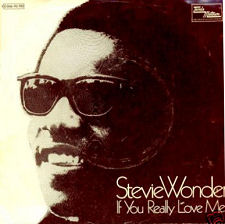
"If You Really Love Me" is a song written by Stevie Wonder and Syreeta Wright. Wonder recorded the song and released his version as a single from his 1971 album Where I'm Coming From. The single peaked in the top 10 of the Billboard Hot 100, Billboard′s R&B chart, and Billboard′s Easy Listening chart.

"Shoo-Be-Doo-Be-Doo-Da-Day" is a 1968 single released by American and Motown recording artist Stevie Wonder. The song, co-written by Wonder and produced by Henry Cosby and Sylvia Moy, was the first to showcase Wonder's talents at the clavinet and was one of his first successful co-written tracks during his 1960s Motown period. The song reached number nine on the Billboard Hot 100 pop singles chart in 1968, and went to number one on the R&B chart.

"Heaven Help Us All" is a 1970 soul single composed by Ron Miller and first performed by Motown singer Stevie Wonder. The song continued Wonder's string of Top 10 singles on the pop charts reaching #9 on the Hot 100 singles chart and #2 on the R&B chart, the latter causing it to be his first runner-up since "Yester-Me, Yester-You, Yesterday". It was one of four hits Wonder scored from his Signed, Sealed & Delivered album. The song has since been covered dozens of times in a variety of styles.
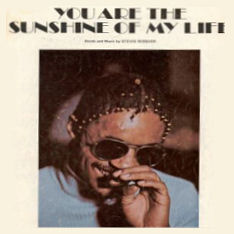
"You Are the Sunshine of My Life" is a 1973 single released by Stevie Wonder. The song became Wonder's third number-one single on the Billboard Hot 100 chart and his first number-one on the Easy Listening chart. It won Wonder a Grammy Award for Best Male Pop Vocal Performance, and was nominated for both Record of the Year and Song of the Year. This song was the second single released from the 1972 album entitled Talking Book, which stayed at number one on the R&B albums chart for three weeks.

"You Haven't Done Nothin" is a 1974 funk single by Stevie Wonder, taken from his album Fulfillingness' First Finale and featuring background vocals by The Jackson 5. The politically aware song became Wonder's fourth Number 1 pop hit and his tenth Number 1 soul hit. It also reached Number 1 in Canada. In the UK the single spent five weeks on the chart, peaking at Number 30.

"Boogie On Reggae Woman" is a 1974 funk song by American Motown artist Stevie Wonder, released as the second single from his seventeenth studio album, Fulfillingness' First Finale, issued that same year. Despite the song's title, its style is firmly funk/R&B and neither boogie nor reggae. It continued Wonder's successful Top Ten streak on the pop charts, reaching number three and also spent two weeks at number one on the soul charts. Billboard ranked it as the No. 26 song for 1975. At the 17th Grammy Awards, Stevie Wonder won the Best R&B Vocal Performance, Male for this song.
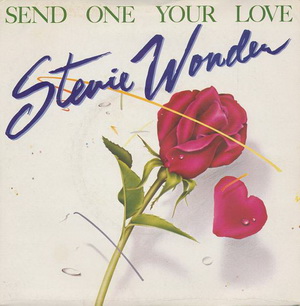
"Send One Your Love" is a 1979 soul single by American and Motown musician and singer Stevie Wonder from his album Stevie Wonder's Journey Through "The Secret Life of Plants" (1979). Released in November 1979 as the album's lead single, the song reached number four on the US Billboard pop singles chart in 1979 The song also became Wonder's second single to top the adult contemporary chart, following 1973's "You Are the Sunshine of My Life", topping the chart for four weeks. On the soul charts, "Send One Your Love" went to number five.
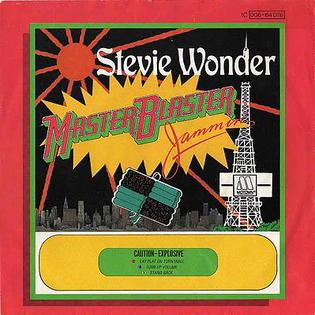
"Master Blaster (Jammin')" is a 1980 song by American singer-songwriter Stevie Wonder, released as the lead single from his nineteenth studio album, Hotter than July (1980). It was a major hit, spending seven weeks at number one on the US Billboard R&B singles chart, reaching number five on Billboard's pop singles chart in the fall of 1980 and peaking at number two on the UK Singles Chart, and number one in New Zealand.

"That Girl" is a song by American R&B singer and songwriter Stevie Wonder. It was the leading single from Wonder's album-era 1982 greatest-hits compilation, Stevie Wonder's Original Musiquarium I, as one of four newer songs from the collection. The song spent nine weeks at number one on the Billboard R&B singles chart – the longest time a Stevie Wonder single spent at the top spot – and reached number four on the Billboard Hot 100.
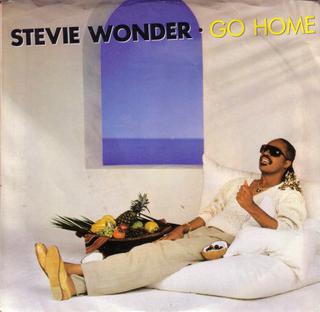
"Go Home" is a song by Stevie Wonder, released as the second single from his twentieth studio album, In Square Circle (1985). The song showcased the narrator's plea to a young woman to go home, though the girl tries to get the narrator to stay with her. In the US, the song peaked at #2 on the Billboard R&B chart and #10 on the Billboard Hot 100 and, to date, is Wonder's last song to reach the US top ten on the Hot 100. "Go Home" also topped both the Billboard dance chart and the Billboard Adult Contemporary chart.

"Superwoman " is a 1972 soul track by Stevie Wonder. It was the second track on Wonder's Music of My Mind album, and was also released as the first single. The song reached a peak of number 33 on the Billboard Hot 100 chart.

"Do I Do" is a song written and performed by American singer and songwriter Stevie Wonder, first released in 1982 on the compilation album, Stevie Wonder's Original Musiquarium I (1982). The single peaked at #2 on the US Billboard soul chart and #13 on the Billboard Hot 100. On the Billboard dance chart, "Do I Do" went to number one for two weeks. Overseas, it reached #10 in the UK.

"Another Star" is a song written and performed by Stevie Wonder from his 1976 album Songs in the Key of Life. It is the final track on side four of the double LP. The flute player Bobbi Humphrey appears in the last section of the song.

"I Don't Know Why" is a song by American singer-songwriter Stevie Wonder, from the 1968 album For Once in My Life. It was released as a single on January 28, 1969, with "My Cherie Amour" on the B-side. A few months later, the single was re-issued with sides reversed because of the growing popularity of "My Cherie Amour", which became a Top Ten hit.

"Never Had a Dream Come True" is a song written by Stevie Wonder and Motown staff songwriters Henry Cosby and Sylvia Moy, released as a single on the Tamla subsidiary in February 1970. Featured on his 12th studio release, Signed, Sealed & Delivered, as the lead single, "Never Had..." was a modest hit in the U.S. upon its release, debuting at No. 67 on the Billboard Hot 100 during the week of Feb. 7, 1970, and No. 11 on the R&B chart. The song received a boost in the U.K. where it eventually peaked at No. 6.




















